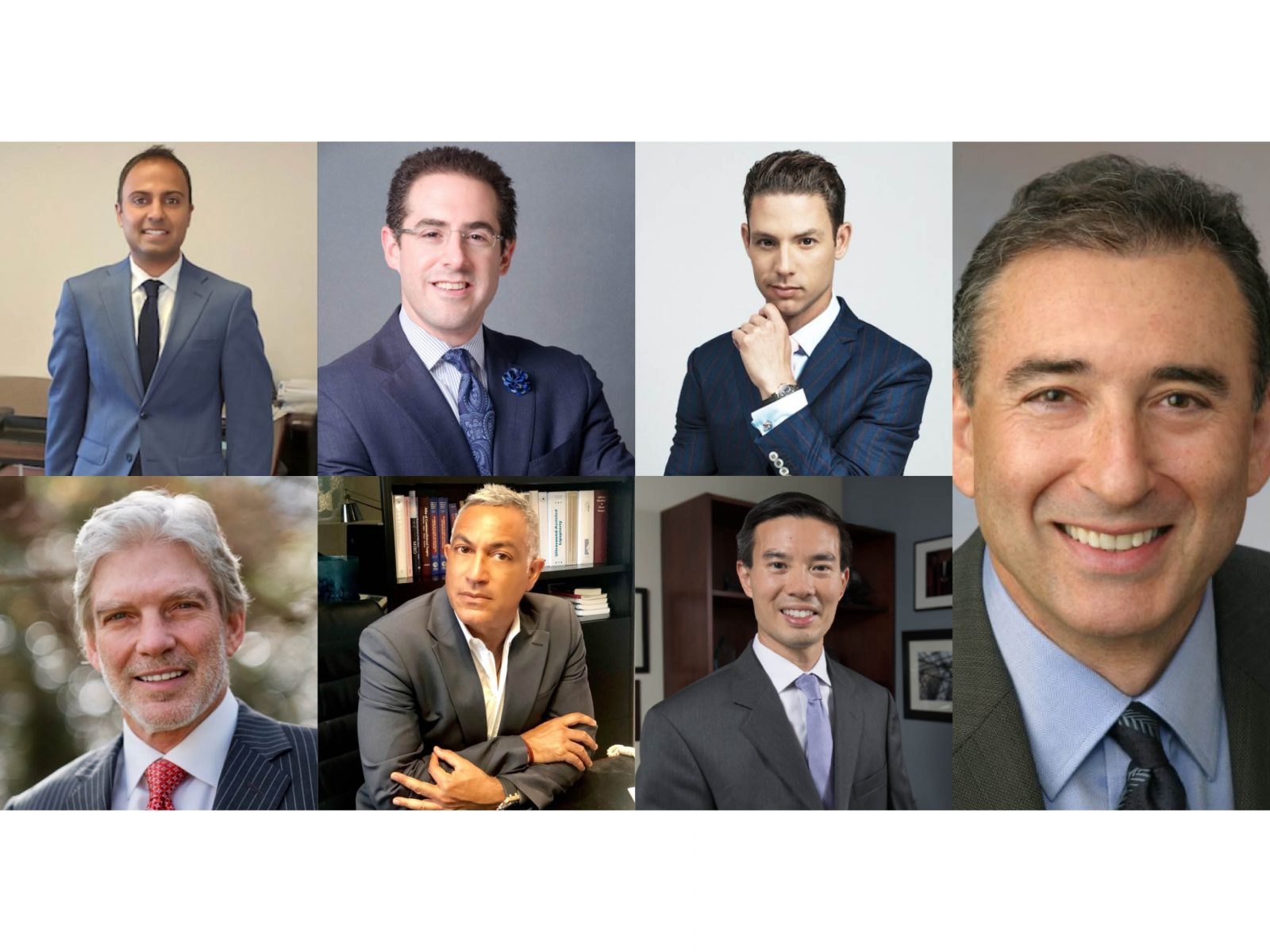We sat down with some of the top surgeons in the industry to get advice on choosing the right plastic and or cosmetic surgeon. Here’s what they had to say.

Dr. Jose Rodríguez-Feliz, eyelid surgery and face expert, Miami/Fort Lauderdale
Patients really have to do their research. What I mean by this goes beyond searching for a board-certified plastic surgeon. Let’s face it, there are many board-certified surgeons with little to no experience and/or interest in certain procedures. That is just the nature of our specialty in particular when it comes to certain procedures that demand a certain degree of knowledge, expertise, and skills such as eyelid surgery, modern facelift techniques, and rhinoplasty. They should ask for before and after, and when possible, if they can talk to someone that has had the procedure done that would be even better! In summary, the search does not stop when you find a board certified plastic surgeon, that is just the beginning!
Dr. G. Hunt Neurohr, face expert, Dallas
Finding the best surgeon for each individual is not always so easy. Patients should check the credentials of the surgeon to determine if he/she is qualified with ABMS board certification. Make sure the surgeon has experience and expertise in the specific area of interest. Usually, plastic surgeons work branches into specialties either more predominately of the face or the body. Although most do both, it is important to get referrals and recommendations from family and friends, beauty specialists (i.e. beauty salon operators), interior designers and from other doctors. Dermatologists are usually more attuned to the top plastic surgeons. Visit at least three surgeons for a consultation and determine who is most favorable to your needs and who communicates best with you. If a good “connection” is not made, keep looking. There is no perfect solution; however, it is extremely important to have confidence in your surgeon and trust that they will take very good care of you. The healing time after surgery can be trying, so it is crucial that the trusting bond established with your plastic surgeon will hold strong to achieve a great result.
Dr. Jason Bloom, face expert, Pennsylvania
I think that there are a number of important things that patients need to look at when choosing the right surgeon for their particular procedure.
1.) Make sure that they are board-certified by their subspecialty. That is the American Board of Plastic Surgery, American Board of Facial Plastic & Reconstructive Surgery, American Board of Dermatology or American Board of Oculoplastic & Reconstructive Surgery. The American Board of Cosmetic Surgery is not a recognized entity by that ABMS.
2.) Ask them how often they perform the procedure that you are interested in and how many they do in a year. For example, not all rhinoplasties are created equal. Some are to take down a bump on the bridge or narrow and rotate the tip, but these are completely different than what it takes to perform an “ethnic” rhinoplasty. Ask for specifics about the procedure you are interested in.
3.) Ask to see before & after photos, but not just the before picture and the after photos that was taken a month or year later. See if you can look at the progress of some of the patients’ recovery so that you will know what a typical recovery will look like in terms of downtime so that you can plan your life.
4.) It is important that your aesthetic matches that of the surgeon that you are choosing. By looking at before & afters and speaking to surgeons, you want to make sure what they like as a good result is the same thing that you like and consider a good result.
Dr. Jhonny Salomon, face and nose expert, Miami/Fort Lauderdale
Choosing a Plastic Surgeon is a choice you will live with for years. When choosing a Plastic Surgeon there are several things that you need to look for. Understanding how to find the right surgeon is the first step in your journey.
- Board Certification – Look for a surgeon that is Board Certified by the American Board of Plastic Surgery.
- Study the surgeon’s style and approach – do they have the expertise and experience to perform the procedure and do their sense of aesthetic matches yours?
- Does the surgeon’s before and after photographs show exceptional results delivered on the procedure you are interested in?
- Vet the facility – It is important to find an accredited facility that is held to the highest standards of safety, quality, and patient care. The facility must be licensed by the state and accredited by the American Association for Accreditation of Ambulatory Surgery Facilities (AAAASF) or by the Joint Commission on Accreditation of Healthcare Organizations (JCAHO)
- Find someone you trust – You need to find a surgeon that you feel comfortable enough with to trust and connect with. Having the ease of communication and a personal rapport with your surgeon and staff is critical. This can make all the difference in the world with your surgical experience.
- Look for honesty – The best plastic surgeons will give you their honest and straightforward suggestions on the ideal approach to your surgery as well as provide you with realistic expectations for your procedure.
Dr. Samuel Lin, nose expert, Boston
Credentials
The first thing you should look for when choosing a plastic surgeon is whether they are board-certified by the American Board of Plastic Surgery (ABPS), which is the plastic surgery board recognized by the American Board of Medical Specialties. To be board certified by the ABPS, a surgeon must meet very rigorous standards and have undergone extensive training. Members of the American Society of Plastic Surgeons are certified by the American Board of Plastic Surgery and meet additional rigorous standards.
Facility Accreditation
It is also important that the surgeon performs their surgeries in accredited operating facilities. Accreditation standards for operating facilities ensure all necessary patients safety standards are met in the operating room. Facilities should be accredited by at least one of the following certification organizations: state licensing organization. Joint commission on Accreditation of Healthcare Organizations (JCAHO), American Association for Accreditation of Ambulatory Surgery Facilities (AAASF), Accreditation Association for Ambulatory Health Care, Title XVIII Medicare participation.
Experience and Confidence
You should look for a plastic surgeon who is an expert in performing the procedure you are interested in, and performs it often. Ask about their experience and approach to the procedure you are requesting. It is important that they are comfortable performing your procedure. Additionally, you can look at before and after photos of the surgeon’s work either on their website or request to see before and after photos at the office.
Your Personal Comfort
You should choose a plastic surgeon with whom you feel comfortable at your consultation. Your comfort can be as important as their credentials. It is important that your plastic surgeon listens to your concerns, answers your questions, and is on the same page about your goals. Clear communication is crucial to achieving your personal goals.
Dr. Boris Ackerman, eyelid/male facelift expert, Orange County
It is an age-old question “How do I find the right Plastic Surgeon”. I am still puzzled why some patients do a lot more research only after undergoing less then successful surgery, as opposed to doing all the research before going under the knife. Ideally, the best way to pick a Plastic Surgeon is to look at his/hers “body of work”. Has the surgeon created consistently excellent results over a course of many years?
Start your research by asking your family doctor, hairdresser, friends, etc. You are bound to get a few recommendations, ask why they recommended that particular surgeon, but that’s just a starting point. Find out if the surgeon is certified by The American Board of Plastic Surgery, does he/she have the privileges to perform your type of surgery at a hospital; what type of facility is your surgeon planning to perform your surgery, is the facility certified, etc.
During your consultation ask some probing questions, in laymen’s terms, about your specific concerns and see how the surgeon responds; it should make sense to you, you must feel that the surgeon listens to you and will respond to your concerns. Next, the surgeon should be able to provide you with a significant gallery of “before and after” photos of their work. Make sure there are more than just a few photos, make sure the photos have the same lighting and positioning. In my practice, we also routinely offer to our new patients an opportunity to meet our post-surgical patients in various stages of healing. Ultimately, before signing up for your surgery, make sure that you feel comfortable with your surgeon and you have assessed all of the points mentioned above.
Dr. Viraj Mehta, eyelid surgery and oculoplastic expert, DMV area
Choosing the right surgeon is critical to achieving your goals. At bare-minimum, choose a surgeon that is Board-Certified by a specialty in the American Board of Medical Specialties (you can look up certification status here: https://www.certificationmatters.org/). This will ensure that your surgeon at least has the basic required medical knowledge and keeps up to date with new advances. Next, look at the surgeon’s training history to see if they’ve trained at quality institutions and hospitals. While this doesn’t guarantee perfect outcomes, a surgeon who went to top universities and trained at top institutions demonstrates a consistent level of excellence. Third, personally meet with the surgeon and discuss in detail your expectations. Your surgeon should listen closely and be able to give you specific details about what he or she thinks will help achieve your goals. He or she should also be able to have an honest discussion about the risks and benefits of any specific surgery and be able to go into more detail about their own complication/revision rates. It also helps to talk to your friends, colleagues, or other physicians you trust about their experiences with specific surgeons. Choosing the right surgeon is a very personal choice. You should choose one with whom you get along because your relationship with this person will last beyond the actual surgery itself. Considering these factors will increase your chances of meeting an outstanding surgeon that will help you achieve your goals.
For more information, visit Dr. Brian A. Levine's social media:

























